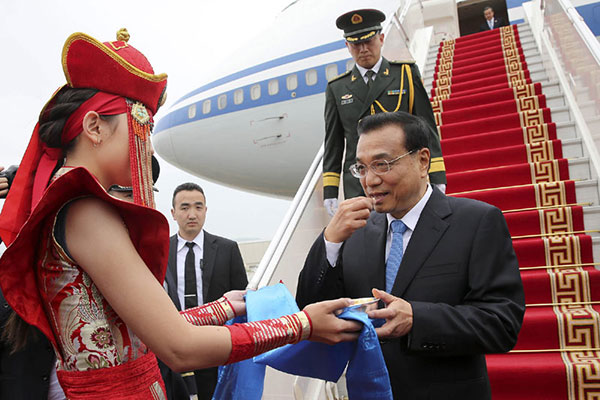
Premier Li Keqiang tastes a dried milk cake upon his arrival at the Chinggis Khaan International Airport in Ulaanbaatar on the evening of July13, to start an official visit. [Photo/Xinhua]
Premier Li Keqiang received a hada, a silk scarf regarded as a token of respect and friendship, and tasted a dried milk cake upon his arrival at the Chinggis Khaan International Airport on July 13, at the start of a visit that he hoped would bring the two countries even closer.
Citing a Chinese saying-”Neighbors wish each other well”-Premier Li said China is committed to enhancing cooperation with Mongolia and pushing forward the alignment of development strategies.
“The bilateral relationship has entered a stellar period, and I hope my visit will deepen cooperation in various fields and bring closer the bonds between our two countries,” the Premier said in a signed article published in Mongolian newspapers on July 13.
Premier Li Keqiang will be the first high-level foreign government leader on July 14 to meet with newly appointed Mongolian Prime Minister Jargaltulga Erdenebat. Erdenebat, a former finance minister, was appointed on July 8.
Premier Li is also scheduled to meet Mongolian President Tsakhiagiin Elbegdorj and talk with Miyegombo Enkhbold, who was elected the new speaker of the country’s parliament last week.
“No matter how things change, Sino-Mongolian relations will remain solid and steady,” the Premier told representatives of Chinese entrepreneurs, embassy staffers and students based in Mongolia.
He joked that it was just a two-hour northerly flight from Beijing to the Mongolian capital, while his southbound journeys in China often take longer.
“People-to-people and cultural exchanges will bring our souls closer,” the Premier said in the article, adding that 1 million Mongolians, or roughly one-third of the population, visited China last year.
Premier Li said Beijing and Ulaanbaatar had reached consensus on strategic synergy between China’s Belt and Road Initiative and Mongolia’s Steppe Road Program, and broad prospects lie ahead for pragmatic cooperation.
The Steppe Road Program is an infrastructure construction proposal aimed at boosting the Mongolian economy through cross-border transportation.
“The connection of the two strategies is vital to Mongolia’s development and the China-Mongolia-Russia economic corridor,” Xinhua News Agency quoted Gao Shumao, the former Chinese ambassador to Mongolia, as saying.
Gao said there was plenty of potential to collaborate on road and rail projects, power, clean energy, tourism, medical care and people-to-people exchanges.
Mongolia’s economy grew by 2.3 percent last year. Influenced by fluctuations in the global market, bilateral trade between China and Mongolia has contracted in the past few years.
Two-way trade plummeted by 20.3 percent in the first five months of this year to $1.7 billion, according to Chinese customs data.
Premier Li’s entourage includes Foreign Minster Wang Yi, Minister of Agriculture Han Changfu, Minister of Commerce Gao Hucheng and Zhang Yong, deputy chief of the National Development and Reform Commission.
The lineup indicates high-level talks will most likely focus on the bilateral relationship, agriculture and husbandry cooperation, trade and development projects.
